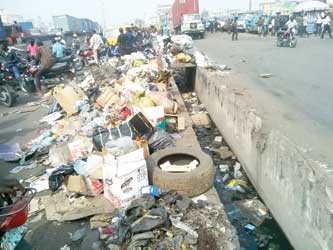An environmentalist, Mr Emmanuel Emechete on Tuesday called for advocacy and sensitisation of Nigerians on the dangers of indiscriminate littering.
Emechete, also a climate change expert made the call in an interview with the News Agency of Nigeria (NAN) in Lagos.
He said that indiscriminate littering, also known as “trash blindness’’, due to the adverse effects on the environment and on public health.
“Trash blindness basically implies negligence to trash. It is when individuals choose to litter their environs without considering the negative impact on the atmosphere.
“Basically, to curtail the trash blind tendencies among Nigerians, we need a lot of enlightenment and education on the adverse effect of a polluted environment.
“We need to inform Nigerians on the dangers of indiscriminate littering and the side effects on not just the environment but our health.
“Littering contributes immensely to drainage blockage.
“The government as well as environmental stakeholders must embark on intense advocacy; we need to talk to people about trash issues.
“Once people can understand that trash blindness is a problem, we need to provide an alternative. If you say do not litter indiscriminately, then you need to provide the alternative,’’ he said.
Emechete called for provision of alternatives for trashing waste and not paying lip service to combating trash blindness syndrome by placing sanctions where necessary.
“We need to provide alternatives for people to trash their wastes; we must back our advocacy with actions if we are to solve the syndrome of trash blindness,’’ he said.
The environmentalist urged that waste bins be provided on every street, walkways and commercial buses, among others, with conspicuous signs posted to direct people where to dispose wastes.
He said that arrangement should be put in place for prompt disposal of these waste bins to ensure sanitary condition of the environment.
“The government can also place sanctions against indiscriminate littering and it should be done with caution to avoid abused by the regulators who extort Nigerians.
“Sanctions should not be paramount, but the sensitisation of Nigerians on trash blindness should be on the front burner.
“Recently, we have heard reports of people drowning in floods as a result of blocked drainages which are remote causes of trash blindness.’’
Emechete said that if Nigerians could see the impact of trash blindness on the health, family, wellbeing and even on climate change, they would be more cautious as compared to having fear for sanctions.
“We should start first with enlightenment and education and if it does not work, we can now place sanctions on defaulters.
“Advocacy and provision for alternative trashing of waste should be put in place before the resort to sanctions on indiscriminate littering of waste,’’ Emechete said.

Leave a Reply
You must be logged in to post a comment.